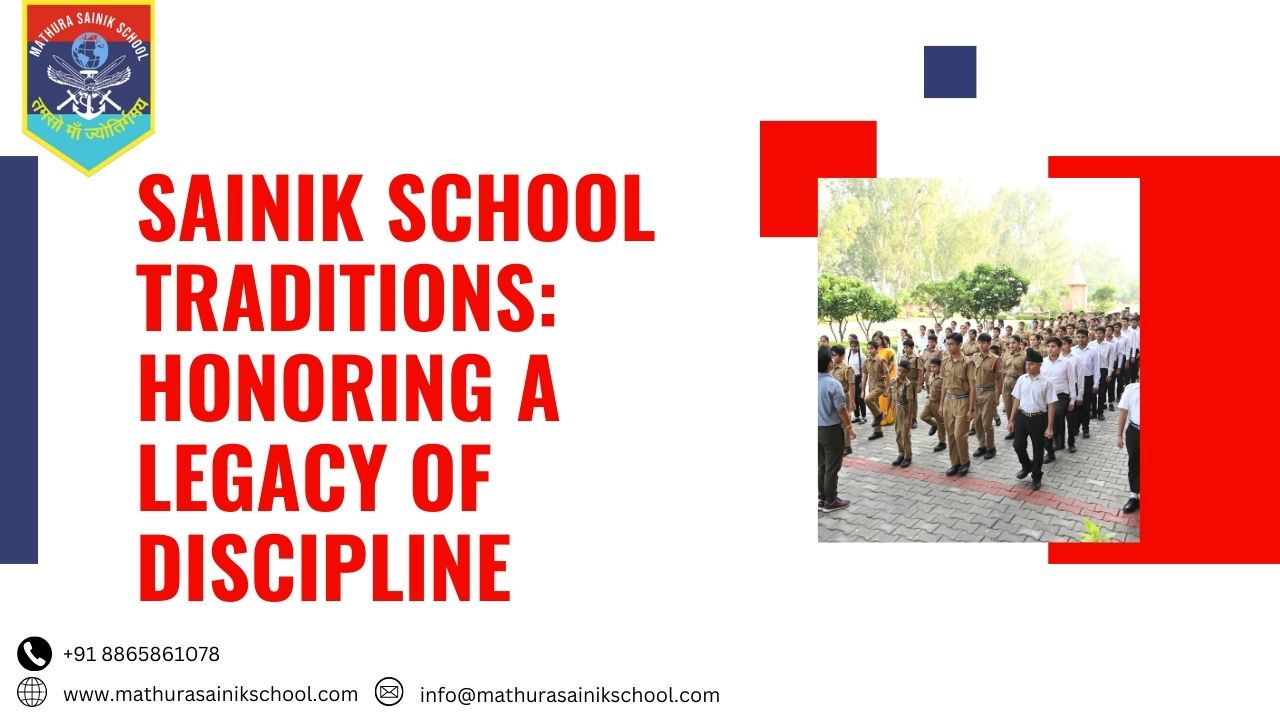
Sainik School Traditions: Honoring a Legacy of Discipline
In the diverse landscape of educational institutions in India, one category stands out for its unique mission and unwavering commitment to producing disciplined and capable citizens – Sainik Schools. These institutions, often overshadowed by their more prominent counterparts, play a crucial role in shaping the future leaders of the nation. In this guest post, we will explore the essence of Sainik School, their history, objectives, and the transformative impact they have on young minds.
The Genesis of Sainik Schools
Sainik Schools are a network of schools in India with a distinctive purpose: to prepare young students for careers in the armed forces and other public service sectors. The roots of this noble endeavor trace back to a committee chaired by V.K. Krishna Menon in 1961, which aimed to develop a system that could provide a steady stream of bright and disciplined cadets to the National Defence Academy (NDA).
The first Sainik School, Sainik School Kunjpura, was established in 1961 in Haryana, and since then, the network has expanded to include 33 schools across the country. These schools are spread across various states, each with its unique contribution to nurturing the future leaders of India.
The Distinctive Approach to Education
Sainik Schools operate on a distinctive educational philosophy that focuses on academic excellence, physical fitness, and character development. This approach is rooted in the belief that military training and values can shape individuals into responsible citizens who are not only academically proficient but also morally upright and physically robust.
Academic Excellence:
Sainik Schools maintain a rigorous academic curriculum that is at par with the best educational institutions in India. The emphasis on a strong academic foundation ensures that students are well-prepared for competitive exams, including the NDA entrance exam.
Physical Fitness:
Physical fitness is a core component of Sainik School education. Students are encouraged to participate in sports and physical activities, fostering discipline, teamwork, and a healthy lifestyle.
Character Development:
Perhaps the most distinctive aspect of Sainik School education is its emphasis on character development. Students are taught values such as integrity, courage, and self-discipline from a young age. The daily routine of these schools instills a sense of responsibility and commitment in students.
The Life of a Sainik School Cadet
Life as a cadet in a Sainik School is unique and demanding. The daily schedule is highly structured, and cadets are expected to adhere to a strict code of conduct. Here’s a glimpse into the life of a Sainik School cadet:
-
Daily Routine: Cadets typically wake up early in the morning for physical training (PT) and follow a tight schedule throughout the day, balancing academic classes, sports, and extracurricular activities.
-
Uniform and Discipline: The uniform is an integral part of a cadet’s life, and maintaining discipline is paramount. Cadets are taught to value punctuality, obedience, and respect for authority.
-
Teamwork and Leadership: Sainik Schools place a strong emphasis on teamwork and leadership development. Cadets participate in various group activities, which help them develop essential life skills.
-
Academic Challenges: The academic curriculum is demanding, but it equips students with the knowledge and skills required for future academic pursuits.
-
Adventure Activities: Sainik Schools often organize adventure activities such as trekking, mountaineering, and camping, which teach cadets to push their limits and overcome challenges.
Impact on Students
The impact of Sainik School education goes beyond academics. It molds young individuals into responsible citizens who are well-prepared for the challenges of life. Here are some of the ways in which Sainik Schools influence their students:
-
Leadership Skills: Sainik School graduates are known for their leadership abilities. The structured environment and leadership opportunities provided during their time in school enable them to take on leadership roles in various fields.
-
Strong Work Ethic: The discipline instilled in Sainik School cadets fosters a strong work ethic that stays with them throughout their lives, helping them excel in their careers.
-
Patriotism and Service: The schools’ emphasis on patriotism and service to the nation instills a sense of duty and responsibility in students, many of whom go on to serve in the armed forces.
-
Holistic Development: Sainik Schools not only focus on academics but also on physical fitness, character development, and extracurricular activities, ensuring that students receive a well-rounded education.
-
Lifelong Camaraderie: The friendships formed in Sainik Schools often last a lifetime, creating a strong support network for alumni.
Challenges Faced by Sainik Schools
While Sainik Schools have a commendable track record, they also face several challenges:
-
Limited Accessibility: Sainik Schools are currently concentrated in certain states, making them inaccessible to many students across India.
-
Financial Constraints: Maintaining high standards of infrastructure, faculty, and resources requires significant financial resources. Securing funding can be a challenge.
-
Evolving Curriculum: Sainik Schools must continually update their curriculum to meet the changing demands of the armed forces and other sectors.
-
Gender Inclusivity: Historically, Sainik Schools have been exclusively for boys. Efforts are being made to address this issue by establishing parallel institutions for girls.
Conclusion
Sainik School In India plays a crucial role in shaping the future leaders of India. Their unique approach to education, which combines academic excellence, physical fitness, and character development, sets them apart from conventional schools. The impact of a Sainik School education extends beyond the individual student; it influences the nation by producing disciplined, capable, and morally upright citizens.


